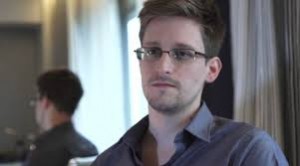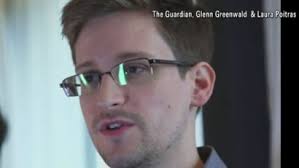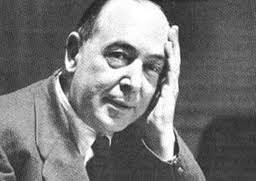I just posted an article about C. S. Lewis’s book The Abolition of Man—which you can see on this blog. Then I watched the video interview of Edward Snowden, the whistle blower of the controversial Prism surveillance program run by the NSA.
I won’t summarize all of the arguments of Lewis’s book, but he does set forward the thesis that new technologies that enable “man’s power over nature” turn out to be not to be the power of “man” generally, but rather the power of a few men over many other men.
The technologies that Lewis had in mind in 1947 were such things as the airplane, the wireless (radio) and contraceptives. Today, no doubt he would mention computers, smart phones…and the internet. These technologies do in fact bequeath power—power that most of us enjoy, like the power of emailing a friend, or listening to The Brother’s Karamazov, or checking our bank account–all while riding a bus, train or taxi (and even on some airplanes).
The power of these technologies are increasing rapidly, and while they may bless the man on the street, they also bolster the man at the bureau. We trust that our governmental agencies like the FBI, CIA and NSA use these great powers well, for our welfare and safety. If we ever suspect that they are using these powers to control, contain and condition the man on the street…well we become a bit nervous and edgy. The same technology that enables the NSA to track a potential terrorist, enables it to track me… a potential dissident. But our government wants (even encourages?) dissidence, or political free speech even of those critical of government policy. Right?
Lewis notes that when a culture has jettisoned objective value (what he also calls the Tao)—real, knowable truth and goodness—then gradually the way it wields power shifts from serving people to conditioning them to act the way the power-holders think best. And what a power-holder thinks best is not determined by an objective standard of what is right and good, precisely because such standards have been rejected. How then to do the power-holders make their decisions? They do what they please—that is to say they follow whatever impulses come to them as the strongest. These power-holders themselves may become what Lewis calls “Conditioners” and “man-moulders:”
They are, rather, not men (in the old sense) at all. They are, if you like, men who have sacrificed their own share in traditional humanity in order to devote themselves to the task of deciding what ‘Humanity’ shall henceforth mean. ‘Good’ and ‘bad,’ applied to them, are words without content: for it is from them that the content of these words is henceforward to be derived.
Could it be that immense power in the hands of few, in a culture without objective value will lead to man-moulding policies that seek to shape citizens into conformity with the prevailing ideals of those exercising this power? Is controlling and conditioning citizens not a great temptation to those possessing power—but no traditional morality? Lewis thinks that these amoral men are not bad men, because they have ceased to be men at all:
It is not that they are bad men. They are not men at all. Stepping outside the Tao, they have stepped into the void. Nor are their subjects necessarily unhappy men. They are not men at all: they are artifacts. Man’s final conquest has proved to be the abolition of Man.
Yes, but can’t we take solace in knowing that these power-holders are going to treat us fairly and well (certainly not as artifacts)? Surely, the great majority of people in these agencies will act for our good, or at least the common good. Lewis, I think, would qualify his answer. To those who hold to objective value (the Tao), we may expect some reasonable degree of benevolent treatment. But what should we expect from those who have rejected objective value?
I am very doubtful whether history show us one example of a man, who, having stepped outside traditional morality and attained power, has used that power benevolently. I am inclined to think that the Conditioners will hate the conditioned.
In Orwell’s 1984, the protagonist Winston Smith (after a great deal of conditioning) learns to love Big Brother, with tears in his eyes. But Lewis suggests that Big Brother never loves the little brother, the man on the street. Neither does Orwell. The man-moulders want to control, shape and produce a new humanity, what Lewis calls a post-humanity.
This is a pessimistic note to be sure. Chesterton says somewhere that he may enjoy a lively dinner conversation with a houseguest who is a moral relativist; but he will still hide the silver at night. Can we trust the good people at the FBI, CIA and NSA? Are they good people? Are they even people?
Finally, do we regard even Edward Snowden as good? If so, by what standard? Watch as most commentators call him either good or bad, but without appealing to any clear standard of objective truth or goodness. The testimony of Snowden himself doubles the irony, as even he does not appeal to any clear standards either. His view of the human good life seems to be the common “live and let live” as every man sees fit. Freedom to many American is now freedom to do as we please and create our own “morality.” Why can’t the folks at the NSA do the same? We all live by…impulse.
I have no way of proving this thesis, but I think that roughly half of all American have rejected objective value, and we are the midst of living out the consequences of this rejection in a thousand ways. Could it be that half of the people working in the FBI, CIA and NSA are themselves without a polished moral compass? We may call for investigations and committee hearings and protest loudly, but until we return to the Tao, we will have no basis to criticize or demand reform. Instead we will pit the impulses of the man on the street against the impulses of the man with the power, with no doubt as to who will win.












Excellent post. Thank you. ‘Abolition’ is a favorite of mine and I cannot wait to go back and read your comments on it.
I was tracking you until you said: “Finally, do we regard the Edward Snowden as good? If so, by what standard? Watch as most commentators call him either good or bad, but without appealing to any clear standard of objective truth or goodness.”
The standard is to two-fold. (1) The U.S. Constitution, which forbids the government from spying on us unless they have good cause and a warrant via the 4th Amendment, and (2) the Bible, which commands us to obey lawful commands of our government in Romans 13. We are a unique government, designed by, for and OF the people, and it is our civil and biblical responsibility to maintain that government within the law of the land.
Rick,
No doubt hitler appealed to your number 2 enthusiastically. This logic is fine until it’s not. The trick in the early stages is to project forward the implications of the said ‘crime’ to see the horrors that await…see Roe v Wade for example.
Did not your government cease to deserve the support offered in Romans 13 at that point or do you support your government’ efforts in ‘women’s health’ under the guise of Romans 13 ?
There is a line in the sand for all of us, some early, some late, and perhaps some will always turn a blind eye. But in a world of darkness in poltical power a light shone upon it is the only way for us to make that decision.
Chris, fantastic article.
Rick, I appreciate the fact that you as a commentator are making reference to standards–even if those standards are being discussed and debated. I will listen to more of the testimony from Snowden himself and perhaps revise my opinion of his own appeal to moral standards. Increasingly our own constitution is viewed as a “living document” that we must reinterpret every generation… and often various political principles clash with one another. The more people do not govern themselves, the more laws we will see restricting freedom to ensure order and safety.
While Snowden and others may appeal to the 4th amendment, I suspect many will ground their appeal in a desire to be left alone to be free….to do as they please, which is itself the denial of objective value, and what the power-holders do.
Concise. Powerful. I would argue, accurate. Relativism leaves a society adrift and angry and depressed. Our souls cry out for a compass and boundaries and certainty.
Great posting. I have been wrestling with this publicly from another angle, and I’m not saying it is better – And despite
my background take much from the Ellul camp on “Technique”. I like the Constitution as a living document, and so with
the Supreme Court dismissing a case several weeks ago, based on no evidence of wiretapping, we can now revisit that
case because we now have it. And this is how we practice the concept of Justice, the interplay of law and legislature, executive in prosecution/justice and judicial/justice in the context of the Constitution and the States that ratify it. The morality here might simply be until this there was no possibility of justice.
One might also want to attempt to argue this from the good/true/beautiful angle as well, is knowing the truth of what
the government does more important than knowing that truth by the government of what an individual is doing? Remember this is an “all in” situation it would appear. lots will be known about everyone, the state simulating omniscience is always
an interesting area to discuss, especially by technical means.
Lastly, on the prose front here, I’m channeling the grand inquisitor in the brothers karamazov and Huxley’s brave new world. Give them happiness (peace) for their freedom, take their bread from them and give it back without a miracle, etc. or just take your SOMA. The State is our God, it takes care of everything, it removes in Taleb’s view randomness which fosters a dynamic and changing world that has life. We are on the path of death.
Chris,
Brilliant! (I am in England). Yes, a wise insight. I would add this coda. I think half the people in the west have not thought about these questions at all–not even to have rejected any set of values. Discernment, what Proverbs calls wisdom, has been eschewed in favor of being nice, not questioning the decisions of others, but in the bargain not questioning our own decisions. If we know, we are implicated. Better not to know or if we do to forget by amusing ourselves. To think deeply is to stop, to use leisure for reflection. God forbid that we should not fill our nonrenewable time with deep thought let alone prayer. Our distractions have consequences.
Excellent Post, very thought provoking. Makes me question my own moral compass…
I ground my opinion in the Bible: “Live as people who are free, not using your freedom as a cover-up for evil, but living as servants of God. Honour everyone. Love the brotherhood. Fear God. Honour the emperor.” 1 Peter 2:16,17
Snowden knew the collection of data was court-ordered and legal, therefore the law was not being broken. He knew this for at least a year. As JoshVoorhees stated at Slate: “…he wasn’t blowing the whistle on anything illegal; he was exposing something that failed to meet his own standards of propriety. The question, of course, is whether the government can function when all of its employees (and contractors) can take it upon themselves to sabotage the programs they don’t like. That’s what Snowden has done.”
I am not comfortable knowing Obama has been lying to us. As Lewis stated above, he would be hard pressed to find “a man who, having stepped outside traditional morality and attained power, has used that power benevolently.” To quote another prominent whistle-blower, Daniel Ellsburg, “The public is lied to every day by the President, by his spokespeople, by his officers. If you can’t handle the thought that the President lies to the public for all kinds of reasons, you couldn’t stay in the government at that level, or you’re made aware of it, a week. … The fact is Presidents rarely say the whole truth—essentially, never say the whole truth—of what they expect and what they’re doing and what they believe and why they’re doing it and rarely refrain from lying, actually, about these matters.”
Ellsburg leaked illegal activities in his Pentagon Papers. His moral compass was a government’s lies about a war they knew they had no chance of winning (thereby an unjust war), yet continued to send soldiers to their deaths. He wanted anonymity, but when discovered, he stayed within the justice system here. He did not flee to a foreign country, leak the papers, then request acknowledgement, as Snowden did.
I feel, while I do not know Snowden’s heart, that he was not malicious, but rather naive about the facts. Much IT savvy but little depth of character. Time will tell. Let God do with his actions what He will.